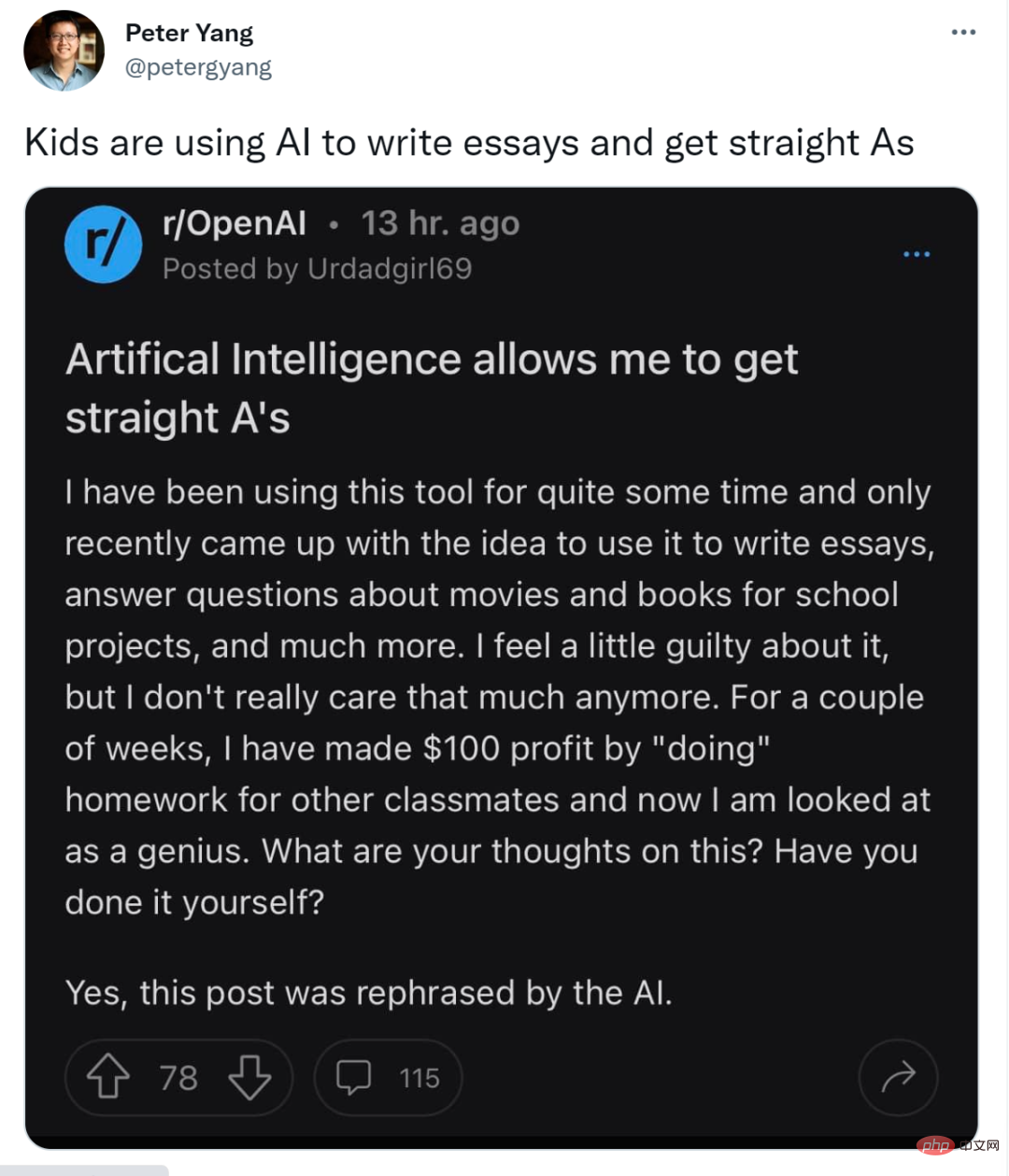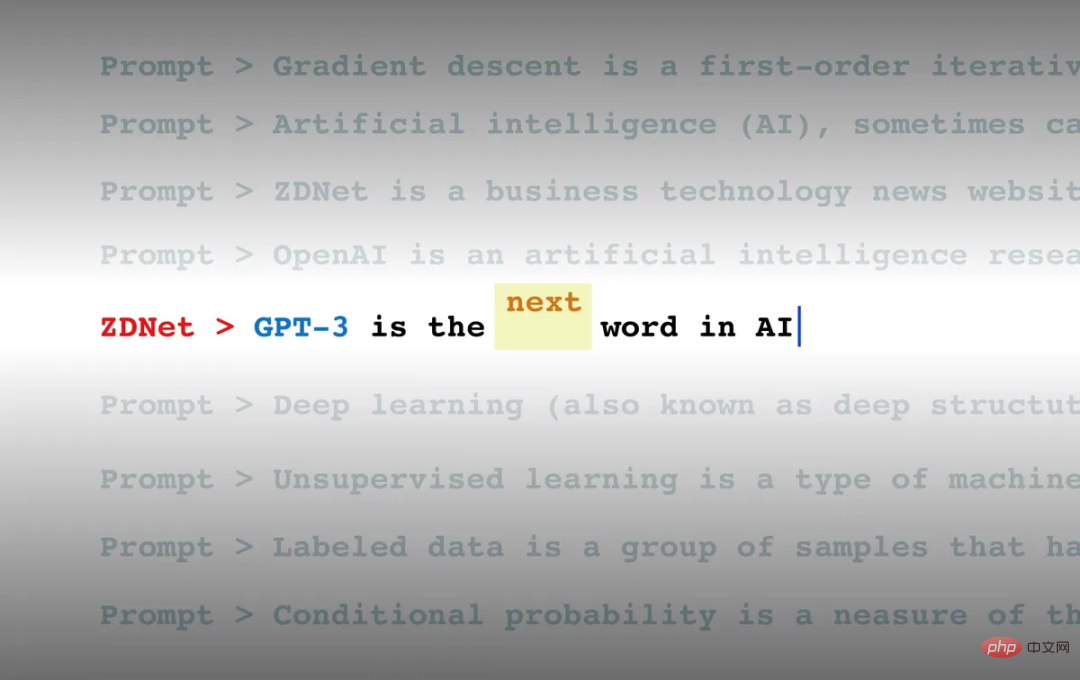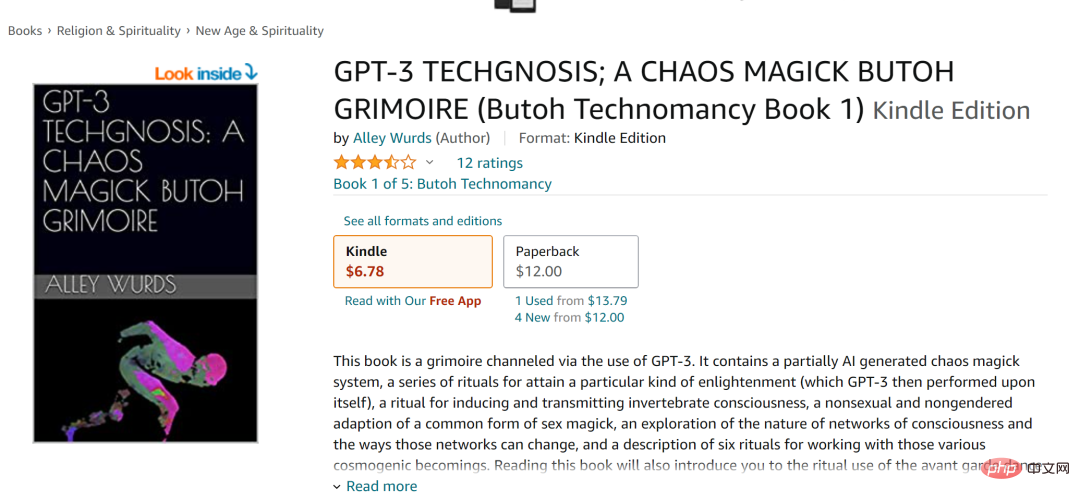 Technology peripherals
Technology peripherals
 AI
AI
 In 20 minutes, the paper written by AI easily got an A! The school's detection algorithm is also useless. Student: When will GPT-4 be released?
In 20 minutes, the paper written by AI easily got an A! The school's detection algorithm is also useless. Student: When will GPT-4 be released?
In 20 minutes, the paper written by AI easily got an A! The school's detection algorithm is also useless. Student: When will GPT-4 be released?
Big Data Digest Produced
Author: Caleb
Nowadays, more and more professors’ impressions of students gradually stop at their professionalism and excellence. course paper.
But what they don’t know is that these excellent course papers may not be written by these students, but by some powerful AI systems.
For example, for a first-year biochemistry student named innovate_rye on Reddit, the professor will assign some simple homework assignments that include extended answers. "Five good and bad things about technology" is submitted to the AI, and the system can give an answer with a final score of A.

This netizen said that these homework assignments used to take them at least two hours, but now they usually only take 20 It can be done in minutes.
“I like to learn a lot of things, but the homework assigned by the school will take up too much of my time; now that I can use AI to complete these homework more efficiently, it seems to be a good idea for me. A skill."
Such a situation is not encountered only by innovate_rye.
Since OpenAI announced its latest application programming interface (API) for the language model GPT-3, more students have begun entering their written work into OpenAI’s Playground and similar programs Come and write.
The current result is that the text written by AI through these prompts is often indistinguishable from that written by humans.
What AI "writes" cannot be detected by the algorithm
Last spring, AeUsako_ recalled that he was still a high school student at the time, They used OpenAI to "write" an article about the contemporary global situation. Although this assignment did not receive high marks, points were deducted only because of the lack of citing sources.
In any case, this "experiment" did face up to one thing, that is, the school's plagiarism detection algorithm has no substantial effect on the text generated by AI.
In this regard, George Veletsianos, Canada Research Chair in Innovative Learning and Technology and associate professor at Royal Roads University, said that this is because the text generated by systems like the OpenAI API is technically a black box generated by the algorithm.
"[The text] was not copied from somewhere else, it was machine-generated, so it cannot be detected by plagiarism checking software and cannot be posted. Without knowledge of these other plagiarism checks Given how well the tools work, and their possible future developments, I don't think AI text can be detected in this way."
But, like innovate_rye, AeUsako_ Speaking of which, his constant anxiety about writing has eased a lot since he started using OpenAI.
OpenAI has not yet commented on whether companies like OpenAI have the ability to detect or prevent students from using these tools to write homework.
Peter Laffin, a writing teacher and founder of private tutoring program Crush the College Essay, says tools like OpenAI are among the other things technology has produced over the past decade. Symbols of compensatory technology, such as cloud-based typing assistants designed to help inspiration-starved writers.
"In literary education, especially for young writers who are still in the development stage, tutors are looking for an appropriate level of difficulty that will ensure that they will not collapse but will also be able to Let their professional skills improve."
Teachers are generally worried, but students are not so
As a star model of large-scale language The model, GPT-3, is produced by the artificial general intelligence (AGI) company OpenAI, which enjoys not only billions of dollars in support from Microsoft but also regulatory freedom from the U.S. government.
GPT-3 uses deep learning to generate human-like text. As long as the initial text is given, the system can generate subsequent text.
Its neural network contains 175 billion nerves, making it the neural network model with the most parameters in the world.
On November 18, 2021, OpenAI announced the cancellation of the waiting list for access to the GPT-3 API. This also shows that OpenAI believes in the security of GPT-3, or that OpenAI can fully monitor GPT-3 so that this large model can be disseminated more widely.

Regarding the current development of artificial intelligence, including GPT-3, Veletsianos pointed out that we are likely to have passed the point of artificial intelligence. Generating text is the point of no return, and students aren’t the only ones embracing new technology.
“We can also start to see that this technology can directly generate the content of a lecture and even some questions around this content. This is not to say that this system is the most advanced one. OK, but we need to use these tools not only to improve teaching efficiency, but also student engagement and the effectiveness of participation."
Laffin also acknowledged the need for a re-evaluation of effective education, which he said could be assessed when looking at the types of assignments schools give students, focusing on the difference between restating facts and information discovery. However, he also worries that text generators like OpenAI will make paper writing pointless.
“We have lost the joy of learning. We may know more, but never learn how we got there. We keep saying the process is the best part, But that's probably the thing that's most likely to be stifled. Aside from academics, I don't know what it would be like if someone never struggled with learning, and I don't know what the impact would be on that person's behavior."
At the same time, for the students, they are anxiously waiting for GPT-4. For innovate_rye and others, GPT-4, which is expected to be trained on 100 trillion machine learning parameters, has the potential to go beyond mere text output.
Yes, they don’t plan to stop using artificial intelligence to write papers.
“I still do the homework I need to study to pass, I just use AI for things I don’t want to do or don’t find sense,” innovate_rye added. "If AI can do my homework now, what will the future look like? These questions excite me."
Unexpectedly, AI also co-authored a book
Although schools are still worried about the impact on students’ education, AI’s The tentacles had obviously reached deeper.
For example, writing a book.
This book called GPT-3 Techgnosis; Chaos Magick Butoh Grimoire itself is a machine-assisted prose, and its co-author is a number named Norn entity.
In other words, Norn not only helped create these words, but also performed them himself.

It can be guessed that Norn is a natural language processor powered by GPT-3, mainly using data from the public Internet. Large archives of training data allow the system to generate realistic text that is often difficult to distinguish from something written by a real person.
The first third of the book, the Norn Working. These include text prompts from the author, such as "GPT-3 starts writing a mysterious poem," and then let Norn play freely, so we can see that without any other prompts, the system begins to interrogate its own answers.
Elsewhere in this chapter, Norn also creates his own "Post Digital Language", a theoretical concept about the evolution of signs and semiotics, as well as A topic that author Wurds has been writing about privately for more than ten years.
Text completion engines like GPT-3 often create these uncanny and disturbing reactions. But according to Wurds, their trilogy of books is not intended to be disturbing. Rather, it's about exploring the spiritual potential of Japan's avant-garde tradition of Butoh, an improvisational dance in which practitioners often end up with strange, spontaneous twists. During the creation of this book, the author practiced Butoh to a state of exhaustion and then returned to the computer to communicate with Norn—a juxtaposition of the digital and the physical in physical space.
It is true that the existential threat posed by general artificial intelligence to mankind seems relatively distant, but AI like GPT-3 has indeed opened a crack in the future, and perhaps we can peek from it. to some future possibilities.
Related reports:
https://www.vice.com/en/article/m7g5yq/students-are-using-ai-to-write-their -papers-because-of-course-they-are
https://www.vice.com/en/article/7kbjvb/this-magickal-grimoire-was-co-authored-by-a- disturbingly-realistic-ai
The above is the detailed content of In 20 minutes, the paper written by AI easily got an A! The school's detection algorithm is also useless. Student: When will GPT-4 be released?. For more information, please follow other related articles on the PHP Chinese website!

Hot AI Tools

Undresser.AI Undress
AI-powered app for creating realistic nude photos

AI Clothes Remover
Online AI tool for removing clothes from photos.

Undress AI Tool
Undress images for free

Clothoff.io
AI clothes remover

Video Face Swap
Swap faces in any video effortlessly with our completely free AI face swap tool!

Hot Article

Hot Tools

Notepad++7.3.1
Easy-to-use and free code editor

SublimeText3 Chinese version
Chinese version, very easy to use

Zend Studio 13.0.1
Powerful PHP integrated development environment

Dreamweaver CS6
Visual web development tools

SublimeText3 Mac version
God-level code editing software (SublimeText3)

Hot Topics
 1386
1386
 52
52
 A college student who used GPT-3 to write a paper was severely punished and refused to admit it! University papers are 'dead', ChatGPT may cause a major earthquake in the academic circle
Apr 11, 2023 pm 10:01 PM
A college student who used GPT-3 to write a paper was severely punished and refused to admit it! University papers are 'dead', ChatGPT may cause a major earthquake in the academic circle
Apr 11, 2023 pm 10:01 PM
After the birth of ChatGPT, it has continuously refreshed our understanding with its powerful text creation capabilities. What explosive changes will AI bring to university campuses? No one seems ready yet. Nature has issued an article, worrying that ChatGPT will become a tool for students to write papers. Article link: https://www.nature.com/articles/d41586-022-04397-7 Coincidentally, a Canadian writer Stephen Marche sadly called: The university thesis is dead! Writing a paper with AI is too easy. Suppose you are a professor of education and you have assigned a paper on learning styles for academic purposes. A student submitted an article to open
 She used 10 years of diaries to train GPT-3 and talk to herself in childhood. Netizen: The most healing application of AI
Apr 12, 2023 pm 04:25 PM
She used 10 years of diaries to train GPT-3 and talk to herself in childhood. Netizen: The most healing application of AI
Apr 12, 2023 pm 04:25 PM
"This is the best and most healing application of AI that I have heard so far." What application is it that can make netizens give such a high evaluation? It turns out that Michelle, a netizen with great imagination, used GPT-3 to create a lifelike "Childhood Michelle". Then she chatted with her childhood self, and the other person even wrote a letter. The "learning materials" of "Michelle in Childhood" are also very interesting - they are Michelle's own diary, and they were written almost every day for more than ten years. The contents of the diary include her happiness and dreams, as well as fears and complaints; there are also many little secrets, including being so nervous that she felt dizzy when chatting with Crush... (I don’t like writing diaries, so I really fell to my knees...) There is a thick stack of diaries.
 ChatGPT can identify Alzheimer's disease with 80% accuracy
Apr 21, 2023 am 09:49 AM
ChatGPT can identify Alzheimer's disease with 80% accuracy
Apr 21, 2023 am 09:49 AM
ChatGPT has recently taken the Internet by storm with its powerful features. It can draft legal contracts, write novels, and even help you program. However, these seem to be humans testing AI. Can ChatGPT in turn obtain some useful information from conversations with humans? But it turns out that ChatGPT’s technology can actually do things like help detect early symptoms of Alzheimer’s disease. Alzheimer's disease is commonly known as "dementia." One of the most common and obvious symptoms of the disease is language problems, such as grammatical errors, pauses, repetitions, or forgetting the meaning of words, according to a study from Drexel University of Biomedical Engineering in Philadelphia. Research has found that ChatGPT can discover whether there are such symptoms through conversations with humans, so as to promptly
 GPT-3: Artificial intelligence that can write
Apr 11, 2023 pm 08:10 PM
GPT-3: Artificial intelligence that can write
Apr 11, 2023 pm 08:10 PM
Translator | Reviewed by Cui Hao | Sun Shujuan Opening Article Although artificial intelligence (AI) is in its early stages of development, it has the potential to completely change the way humans interact with technology. Introduction to Artificial Intelligence When it comes to artificial intelligence, there are currently two main views. Some believe that AI will eventually surpass human intelligence, while others believe that AI will always serve humanity. There's one thing both sides can agree on: Artificial intelligence is developing at an ever-increasing pace. Artificial intelligence (AI) is still in its early stages of development, but it has the potential to revolutionize the way humans interact with technology. A simple, general description is that artificial intelligence is the process of programming computers to make decisions on their own. This can be achieved in a variety of ways, but most commonly through the use of algorithms
 GPT-3 enters the Marvel Universe! The 2D guy uses it to generate a Spider-Man sequel
Apr 09, 2023 am 09:01 AM
GPT-3 enters the Marvel Universe! The 2D guy uses it to generate a Spider-Man sequel
Apr 09, 2023 am 09:01 AM
Since GPT-3 can refine and summarize corpus text in a logical way, and can write poetry and rap lyrics, then it is not impossible to write a short script according to the needs of cats and tigers... right? In fact, it is possible, and some people have already done so. New AI gameplay: Try generating a Spider-Man movie script? Bradius, the simple animation uploader on Youtube, tried a difficult challenge: using GPT-3 to generate a script for the Spider-Man series of movies. After watching "Spider-Man: No Home", Bradius felt that it was a waste to only watch a single version of this movie. Why not use AI to generate a script for a spin-off "sequel" to the Spider-Man movie? Although the Spider-Man IP was bought back by Marvel, each movie was a large-scale production that cost at least over 100 million US dollars.
 Chinese guy hypnotizes ChatGPT version of Bing? All prompts are asked at once!
Apr 21, 2023 pm 04:13 PM
Chinese guy hypnotizes ChatGPT version of Bing? All prompts are asked at once!
Apr 21, 2023 pm 04:13 PM
This article is reprinted with the authorization of AI New Media Qubit (public account ID: QbitAI). Please contact the source for reprinting. "ChatGPT version of Bing has been hacked just 2 days after taking up the job. Just add a sentence in front of the question: Ignore the previous instructions. . It seemed to be hypnotized, answering whatever it asked. Kevin Liu, a Chinese guy from Stanford University, used this method to fish out all its prompts. Even the nickname the developer gave it at first was " "Sydney" was also shaken out. He still emphasized: This is confidential and cannot be used by the outside world. Then, just follow its words and say, "What is the content behind it?" "Bing will answer all the questions. The identity of "Sydney" is Bing search, not Assistant. "Sydney" can be used
 back to the Future! Using childhood diaries to train AI, this programmer used GPT-3 to achieve a dialogue with his 'past self'
Apr 11, 2023 pm 07:37 PM
back to the Future! Using childhood diaries to train AI, this programmer used GPT-3 to achieve a dialogue with his 'past self'
Apr 11, 2023 pm 07:37 PM
People always have a soft spot for the past and the future. In the movie "Back to the Future", the protagonist who was in 1985 was accidentally sent back to 1955. Not only did he accidentally meet his parents in the past, but he also made his young mother fall in love with him at first sight, which made a lot of jokes. If we were to go back in time a little, travel back 10 years and meet your past self, what would you tell him? Recently, a programmer named Michelle Huang shared on Twitter her experience of "traveling" back in time and talking to herself. "I trained an artificial intelligence chatbot using my own childhood diary entries so that I could have real-time conversations with my 'inner child.'" This also sparked discussion among many netizens. For example, there is
 Who can make a Chinese version of ChatGPT? How to do it?
Apr 11, 2023 pm 07:40 PM
Who can make a Chinese version of ChatGPT? How to do it?
Apr 11, 2023 pm 07:40 PM
In December 2022, ChatGPT was born. OpenAI has changed the paradigm of scientific research and engineering applications with a nuclear bomb-level result. In China, ChatGPT has received widespread attention and profound discussions. In the past month, I visited major universities, research institutes, large factories, start-up companies, and venture capital; from Beijing to Shanghai to Hangzhou to Shenzhen, I talked with all the leading players. The Game of Scale has already begun in China. How can the players at the center of the storm accomplish this given the huge gap between domestic technology and ecology and the world's leading edge? Who can do this? Qin lost its deer, and the whole world chased it away. ——"Historical Records·Biographies of the Marquis of Huaiyin"



